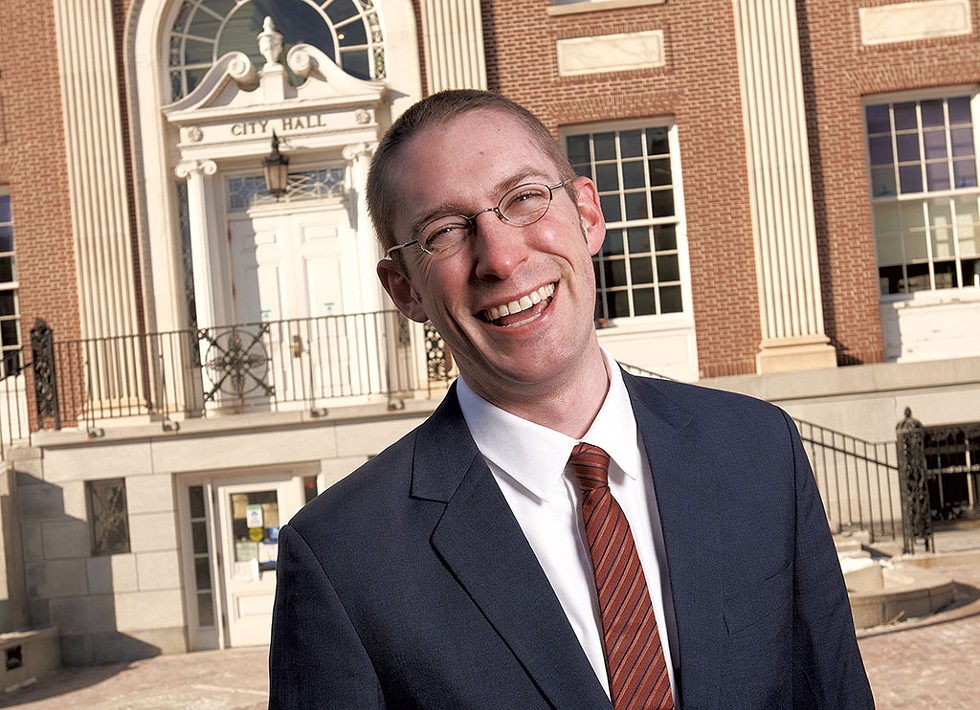
- Bear Cieri
- Max Tracy
The thermometer read 28 degrees as Max Tracy stripped off a fourth layer of clothing and hobbled barefoot toward the frigid waters of Lake Champlain.
The 34-year-old Burlington City Council president had trekked to Oakledge Park on January 7 to mark a milestone in his quest to become the Queen City's next mayor. Supporters had surpassed Tracy's goal of raising $25,000 by New Year's Eve, and now they tuned in remotely to watch their candidate keep his promise to jump in the lake if he hit that target.
"Little chilly," Tracy said with a boyish giggle as he removed his undershirt and khaki pants, revealing swim trunks. He dove into the icy water and emerged a second later, red-faced and laughing. "That was fun!" he said to the camera, and proceeded to thank his donors, in no apparent rush to towel off.
The virtual crowd ate it up. "The only way Miro could beat this is to go in naked!" one Tracy supporter commented on Facebook. "This is the energy we need right now," wrote another.
Tracy's polar plunge was perhaps a silly stunt, but it also served as an apt metaphor for the hard-line Progressive's promise if he is elected in March: to send a shock through the system.
In his bid for the city's top job, Tracy has offered a vision for Burlington in stark contrast to the one championed by Mayor Miro Weinberger, the three-term incumbent. Though Weinberger would be considered a liberal Democrat in most settings, in increasingly progressive Burlington, he is seen as a centrist who touts his fiscal management and emphasizes incremental reform.
Tracy, on the other hand, promises to fight for sweeping new policies, including rent stabilization, a luxury real estate transfer tax and community control of the police. A professional union organizer who rents an apartment in Burlington's Old North End, Tracy says city residents want radical change after nearly nine years of "Status Quo Miro."
There's some evidence to support his claim. Since 2019, Progressives have booted four moderates from the city council, shifting the balance of the governing body further and further left. Activists have marched to Democratic politicians' homes several times to demand support for Progressive-led calls for racial and economic justice. And scandals involving the Burlington Police Department have chipped away at Weinberger's incumbent advantage.
"I think Miro has completely lost touch with what is needed now for the city and for people to thrive and be heard," said Llu Mulvaney-Stanak, a New North End resident working on Tracy's campaign. "He's had so many opportunities to do that, and I feel like, at this point, he just doesn't have it in him."
But the Progs' ascent has also stoked fears among other residents that if Tracy takes city hall, there will be no stopping the Progressive agenda. Weinberger himself has warned that electing a Progressive could weaken the city's financial standing as the local economy recovers from the coronavirus pandemic.
"We [don't] need a radical change in leadership at the top, especially in these times," said Peter Bahrenburg, a New North Ender and Weinberger supporter. "Miro's done a good job guiding us the last several months, and we're certainly in better shape than when he took over."
Meanwhile, five additional candidates, including City Councilor Ali Dieng (I-Ward 7), are also in the running, creating the very real possibility that they could split the opposition and hand Weinberger a fourth term.
Tracy has just a month to convince voters that Weinberger's steady-as-she-goes approach can't answer the calls for change that have propelled Tracy and his party to power on the city council. His success depends on whether voters see him as a leader — or as an activist gone off the deep end.
Riding the Progressive Wave

- Courtney Lamdin ©️ Seven Days
- Max Tracy at Oakledge Park in Burlington
As a youth raised on evangelical Christianity in a Chicago suburb, Tracy was never exposed to social movements. He had to seek them out.
His "awakening" came when he was 16 years old in 2003 and attended a protest against the Iraq War with a friend. He later joined his high school's debate team and the Gay-Straight Alliance's executive board. When right-wing students held an anti-gay demonstration one year, Tracy donned a rainbow cape and spent the day challenging his classmates' bigoted views.
Tracy's activism blossomed when he was a student at the University of Vermont; he joined hunger strikes, naked marches and sit-ins to advocate for a livable wage for UVM staff. Later, as an employee in UVM's international admissions office, Tracy started a union drive that did not succeed.
He was elected to the city council in 2012, the same year Weinberger became mayor. At the time, only two other Progressives sat on the 14-member council. (After a realignment, the body now has 12 members.)
Tracy soon earned a reputation as a councilor passionate about his principles. A climate activist, Tracy doesn't own a car and arrived at pre-pandemic council meetings with a bike helmet in hand. Even before this campaign, Tracy often took direct aim at Weinberger during council debates, his face reddening with every pointed critique.
Tracy has also opposed many of the proposals favored by Weinberger and the Democrats. He was one of four councilors to vote against basing Vermont Air National Guard F-35 fighter jets at the Burlington International Airport. Asked about the F-35s in an interview last month, Tracy began, "I would look for every opportunity to get rid of the" jets, then stopped himself and said instead that he would like to see "a different mission for the Guard." He is also the only councilor to have consistently voted against the CityPlace Burlington downtown redevelopment project, which started — and stalled — on Weinberger's watch.
Progressives could do little to challenge the mayor's agenda until recent elections shifted the council's balance of power. In 2019, political newcomer Perri Freeman won the Central District seat by outpolling incumbent Jane Knodell, a longtime Progressive who some felt had too closely aligned with Weinberger. Fellow young Prog Jack Hanson ousted an incumbent in the East District the same year. The party took two more seats last March, bringing their numbers to six, the most ever during Weinberger's tenure. Photos of Tracy at the Progs' party that election night — hands raised above his head in a jugular-bulging, joyous scream — captured the moment he realized his party could compete citywide.
"We were in a place where that was not only possible but necessary," Tracy said. "We have a very different vision than the current administration and want to take the city in a different direction."
Since then, the council has passed what could be billed as the greatest hits of Progressive Party policy. Progressives successfully put measures on the Town Meeting Day ballot to ban no-cause evictions, reinstate ranked-choice voting, and regulate home and commercial heating systems. The ambitious platform, with Tracy at the helm, has induced Weinberger to pull out his veto pen twice in six months. He'd never used it during his previous eight years in office.
While Tracy's demeanor has mellowed as council president, his management of the meetings' public forums has come under fire. During recent debates on police reform, Tracy gave people of color the top slots in time-limited forums, prompting the police union to complain that he was silencing opposing viewpoints. Tracy stopped the practice in recent weeks after hearing from the city attorney, but he still touts his approach on his campaign website as a hallmark of his progressive record.
Democrats, including Weinberger, have labeled today's Progressive Party "extreme," "dogmatic" and "dangerous." The new wave has also alienated longtime members of the party. Tiki Archambeau, a former chair of the Burlington Progressive Party, is running against incumbent Councilor Freeman in the Central District because he thinks today's Progs have gone too far left. Archambeau hasn't endorsed a mayoral candidate, but former councilor Knodell is backing Weinberger, and so is Peter Clavelle, the city's longest-tenured mayor. Former mayoral hopefuls Steve Goodkind and Carina Driscoll — who ran as an independent in 2018 with the Progressive endorsement — said they will vote for Dieng.
Knodell and Driscoll said Tracy and his ilk are impulsive and pass measures without considering their implications, such as the vote last June to cut the city police roster by 30 percent. As a result, Weinberger says, the department is facing a staffing crisis.
Driscoll, herself a former chair of the Burlington Progressive Party and the stepdaughter of U.S. Sen. Bernie Sanders (I-Vt.), is supporting Dieng because she says he's the only inclusive leader in the race. Living in the New North End, known to be a more conservative city neighborhood, has taught Dieng to balance all sides of an issue, she said. That's in sharp contrast with Tracy, Driscoll said, adding that his brand of politics "has a hold on the Progressive Party, but it is not the entire progressive vision."
State Rep. Selene Colburn (P-Burlington), who once served on the city council with Tracy, sees a different political landscape. She cites the Progressives' capture of four seats in contested races over two years as evidence of growing support for the party's policies. And she challenged the notion that the Progressives' agenda is so radical it cannot attract support from other parties. The Progs hold only six council seats, so at least one Democrat or independent has to vote alongside them to pass a resolution — and they often do.
Decisions aren't made in "some Progressive vacuum," Colburn said. "They're happening with collaboration."
A Tracy Administration
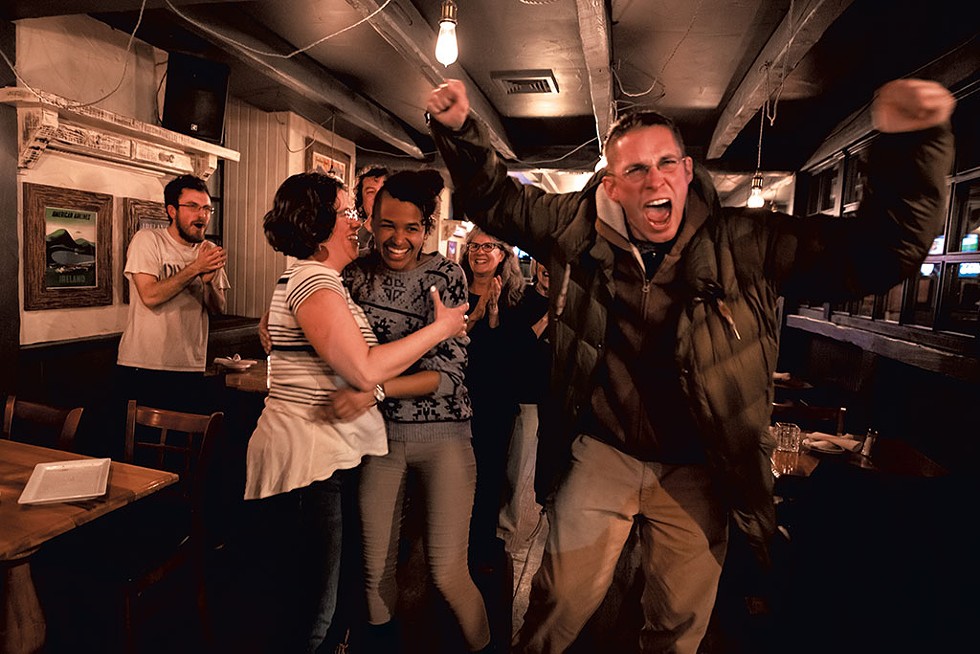
- File: Luke Awtry
- Max Tracy celebrating at a Progressive election night party in March 2020
Colchester resident Norman Burnett can't vote for Burlington's next mayor, but he sure has an opinion about the race. Burnett has owned rental properties in Burlington for 20 years and says he's tired of politicians who want to ban certain types of evictions — or worse, dictate how much he can raise his rent each year.
So when he learned that Tracy — a champion of these and other tenant-friendly policies — was running for mayor, Burnett erected massive plywood signs outside his buildings.
"Vote No to Max Tracy," one on Intervale Avenue reads. "No New Taxes."
The rest of the street is dotted with pro-Tracy signs, as are many other streets in the Progressives' Old North End stronghold. Down the street from Burnett's building, MacKenzie Murdoch fashioned a sign out of an old bedsheet: "Max for Mayor," it reads, alongside two spray-painted hearts.
"I live with all young, progressive people, and we all are really excited to see someone who aligns with our values," Murdoch said, pointing to Tracy's support for tenants' rights and racial justice. "Just knowing that there's someone in an elected position who stands with my same morals ... always feels good."
Tracy said his primary goal if he is elected will be to lift up the marginalized communities he says Weinberger has left behind. A Mayor Tracy would introduce a "participatory budgeting" process in which voters would decide whether to fund neighborhood projects proposed directly by residents. He'd consider assigning more staff to help businesses recover from the coronavirus. And, to Burnett's point, he would advocate for a new tax to fund affordable housing projects.
Housing policy looms large on Tracy's agenda. He would propose limiting rent increases to a certain percentage each year so costs don't outpace wage growth. Already, nearly 60 percent of Burlington renters spend more than 30 percent of their income on rent — and more than half the households in the city are renters.
"This would certainly be a tough fight, but I think it's crucial that we get housing costs under control," Tracy said.
Tracy would pair his rent stabilization plan with a mandate for landlords to weatherize rentals, such as by installing energy-efficient windows. (In an interview, Weinberger deftly noted that he proposed this exact plan at his housing summit, a daylong event in 2019 that focused on various housing challenges.)
Tracy says tenants shouldn't have to bear the high cost of heating drafty apartments. "Absent requiring it, it's not going to happen," he said.
Unsurprisingly, Tracy hasn't won over many landlords. James Unsworth, whose family business operates 17 rental units in Burlington, said Tracy's housing reforms would burden landlords who operate on smaller margins than the likes of big outfits such as Redstone, Bissonette Properties and Handy's Property Rentals.
He also disagrees with Tracy's position on evictions. The candidate supports an initiative that, if approved by voters in March and later by the legislature, would prevent landlords from evicting residential tenants without a reason. Tracy would also propose banning evictions for commercial tenants during the pandemic.
"I feel like sometimes these Progressives come at this in this adversarial kind of light — landlord bad, tenant good, end of story — and it's just not the case," Unsworth said. "We are here to work with renters and get through this together as a community."
Fellow landlord Patrick Johnson, however, thinks Tracy's proposals are reasonable. The Ward 2 resident rents out four units, including his owner-occupied duplex just down the street from Tracy. He noted that three of six Progressive councilors are also renters.
"Finally, that portion of the population of Burlington has a voice, and I don't think they've been radical," Johnson said of council Progs. "They're just saying the neoliberal agenda has failed, again. The mayor likes to talk a good talk, but the rent still goes up."
Weinberger disputes this claim, saying that his efforts to boost the city's housing stock keep annual rent increases down. Indeed, the city's rental vacancy rate has more than doubled since Weinberger took office — from a dismal average of 0.7 percent between 2006 and 2011 to an average of 1.5 percent between 2012 and 2018 — but there's no city-level data showing the effect on rental costs.
Instead, Weinberger points to anecdotal evidence from landlords and to a 2018 county-level market study, which showed that annual rent inflation decreased from 2.9 percent to 1.7 percent between 2014 and 2019.
Further, Weinberger says rent control is a failed policy. He pointed to a 2019 study that concluded San Francisco renters were less likely to move if their rent was controlled, and, over time, developers built fewer rent-controlled units. The supply decreased, and the market rates increased — defeating the purpose of rent control altogether.
Tracy also has strong views on police reform, and he voted last June to reduce the size of Burlington's force. He also supported a Progressive-led effort to create a citizen board to investigate and discipline cops for misconduct.
Weinberger opposed "defunding the police" and blames Progs for the department's swiftly dwindling roster. Eleven officers have left since last summer, endangering the city's overnight police coverage. Last week, Weinberger slammed councilors for delaying a vote on his plan to increase the maximum force size by 10 officers. And last month, he vetoed the control board proposal.
Both initiatives had wide support from racial justice activists, who called into council meetings by the hundreds to demand accountability after several cases of alleged excessive use of force came to light in 2019. Last summer, demonstrators twice protested at Weinberger's home, once causing his wife and young daughters to flee in fear.
Driscoll, the former mayoral contender, said Tracy never condemned those acts. "Unless you are denouncing that movement, you're a part of that movement," she said. "There is no place in the mayor's office for someone who aligned themselves with that."
Two former councilors from the New North End share Driscoll's concerns. Republican Kurt Wright said Tracy is "anti-police" and would drive cops out "at a faster rate than ever." Democrat Dave Hartnett lamented Tracy's support for the Battery Park movement, last summer's monthlong protest and park occupation that featured nightly demonstrations on Church Street.
"It almost feels like this new wing of the Progressive Party wants our police department to fail," Hartnett said. "I think [Tracy] leads the charge, actually, when it comes to this issue. This is the one thing that really scares me about Max."
For his part, Tracy says he's not a police abolitionist. Rather, he said he would move to replace some armed police with professionals who can help people experiencing homelessness, drug use and mental health issues — crises that Tracy says cops aren't trained to handle.
He also remains concerned that Burlington police use force against Black residents at a disproportionate rate. Department data show that Black people represented 28 percent of use-of-force cases during the first 10 months of 2020, despite comprising just 6 percent of the city's population. That rate is the highest recorded since Weinberger took office.
"Our current system is not working for everyone," Tracy said.
Incumbent Advantage
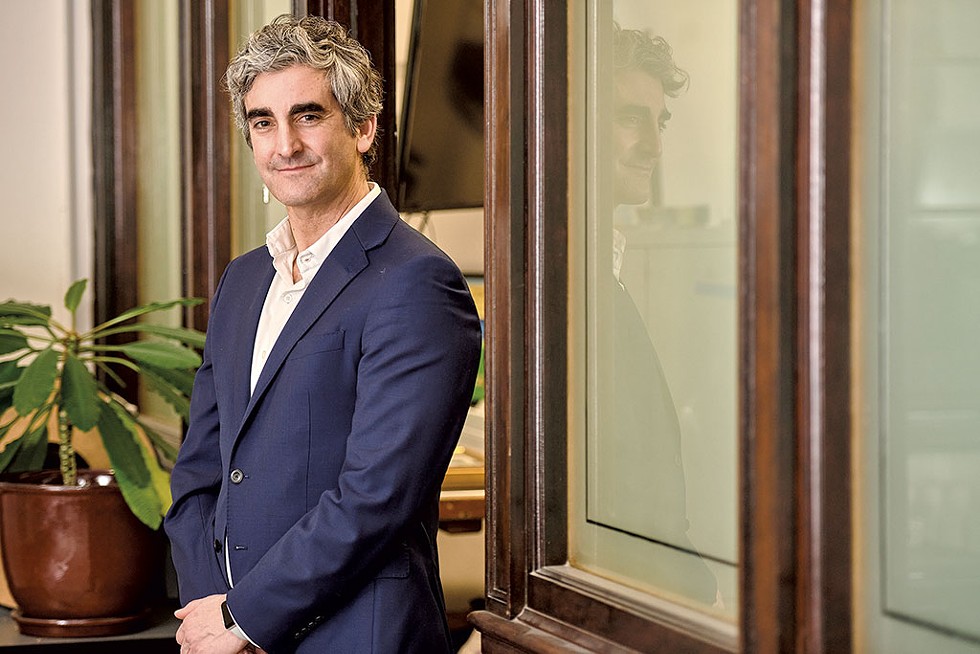
- Bear Cieri
- Mayor Miro Weinberger
One of Tracy's challenges in the mayor's race is to overcome Weinberger's reputation as a careful steward of the city's finances and a steady leader during the coronavirus pandemic.
When Weinberger became mayor in 2012, he had a mess to clean up. His Progressive predecessor, Bob Kiss, had diverted $17 million in city funds to rescue the failing Burlington Telecom, tanking the city's credit rating to junk bond status. Weinberger has since revived the city's credit, saving millions of dollars in interest on borrowed money.
Weinberger has touted his financial prowess in every election since. His supporters say the city needs those skills now more than ever to recover from the pandemic.
"If we stumble coming out of the gate after this thing is behind us, it's gonna be difficult to overcome," former councilor Hartnett said. "I just think [Miro] has extraordinary leadership skills when it comes to those issues."
For a politician more comfortable off-camera than on, Weinberger has devoted a considerable amount of virtual face time to the virus. In the early days, he held thrice-weekly Zoom press conferences with expert guests, talk-show style. He was also nimble in reassigning city workers to distribute cloth face masks, help residents find COVID-19 testing sites and more.
Mark Bouchett, co-owner of Homeport on Church Street, said Weinberger's pandemic leadership has kept his and other businesses afloat. The city temporarily stopped collecting taxes on restaurants' gross receipts and didn't charge fees to businesses on the Church Street Marketplace. Last summer, the city closed off several downtown streets to vehicles on weekends so merchants could safely sell products outdoors.
"The mayor and his staff went out of their way," Bouchett said.
Weinberger says nine years running a 600-employee workforce and managing a $200 million budget prepared him well for handling the pandemic. He said his experience will be vital in competing for the coronavirus relief funds proposed by the Biden administration.
"Is this the moment for on-the-job training?" Weinberger posited. "The experience of the mayor in responding to crises matters."
The city's firefighter union endorsed Weinberger last month, citing his strong fiscal management and leadership during the pandemic. The unions that represent police officers and most other city workers had yet to endorse a candidate.
Weinberger said he worries about handing the reins to Tracy during the downturn. For one thing, he says Tracy hasn't consistently supported the Burlington International Airport, which Weinberger calls a crucial driver of the city's economy. In October 2019, Tracy voted against a plan to expand the airport apron, which promised to bring in more flights and revenue. Last month, Tracy voted to accept a federal grant for airport improvements but said he's generally opposed to expanding the travel hub. Progressives have previously raised concerns about air travel's impact on the climate crisis.
Tracy told Seven Days he wants to reduce greenhouse gas emissions at the airport but would not support shutting it down. At this, Weinberger scoffed.
"If you stop taking federal money and object to these capital investments ... that's gonna have a material impact" on the airport's future, he said.
Former councilor Knodell, an economics professor at UVM, said some of Tracy's policies could also hurt small businesses. Reducing police coverage and creating income-based taxes, such as on real estate transfers, could dissuade both entrepreneurs and residents from settling in Burlington, she said, which would strain the tax base and threaten city services.
Taxes are Jeff Comstock's primary concern. Though he's no Weinberger fan, Comstock, a 40-year resident of the New North End, is voting for the incumbent. He called it a defensive move against Tracy, whose "socialist welfare state" agenda is akin to that of Sen. Sanders — a comparison that would make Tracy blush but one that Comstock did not intend as a compliment.
Comstock said he fears taxpayers would bear the brunt of Tracy's social programs, which include paying the city's seasonal employees a livable wage and securing hazard pay for all frontline workers in Burlington. Comstock said Tracy seemingly has no plan to boost the city's grand list, which would create tax revenues to offset the cost of these programs.
"He talks about housing support and jobs support and wage support ... without actually focusing on economic development," Comstock said. "To me, the order in which [he approaches] those priorities is backwards."
Tracy doesn't deny his belief that people with greater means should pay a larger share. He also dismissed the notion that he's unprepared to lead the city. He's helped design budgets both as a councilor and a UVM employee, he said, and has negotiated contracts for labor unions.
Tracy supporter Mulvaney-Stanak said the Prog candidate would build a strong administration to guide him, just as Weinberger did. Tracy also has nine years of council experience to draw on, whereas Weinberger had never held elected office before his 2012 mayoral victory, Mulvaney-Stanak added.
Others say Weinberger's own record could be a liability. Henry Street residents Michael and Caryn Long supported Weinberger's first mayoral bid but became disenchanted with the candidate who had once promised a "fresh start."
They were disappointed with Weinberger's stance on selling publicly owned Burlington Telecom and said he mishandled the scandal that took down two police chiefs who had created anonymous social media accounts. The Longs say Weinberger cozies up to developers instead of serving the people.
Their evidence: In 2016, Weinberger created a political action committee to influence a public vote on a controversial zoning change that would allow the CityPlace developers to build up to 14 stories high. The Longs said Weinberger dismissed the many Burlingtonians who thought the towers would be too tall. The couple was part of a group that sued the city after the ballot item passed.
Ironically, three years later, the developers scaled back their design. It was too expensive to build.
"I feel like the mall just totally divided us," Caryn Long said, adding, "Miro, who's supposed to be a developer, let this happen to our city."
The group's lawsuit has since been settled, but another — this one filed by the city against the developers — is pending, further delaying construction. What's left of the site, known derisively as "the pit," has stained Weinberger's legacy, the Longs said.
"I wouldn't think anybody would vote for him," Caryn Long said, "but I know they will, because they have short memories on how bad things have been."
A Path to Victory
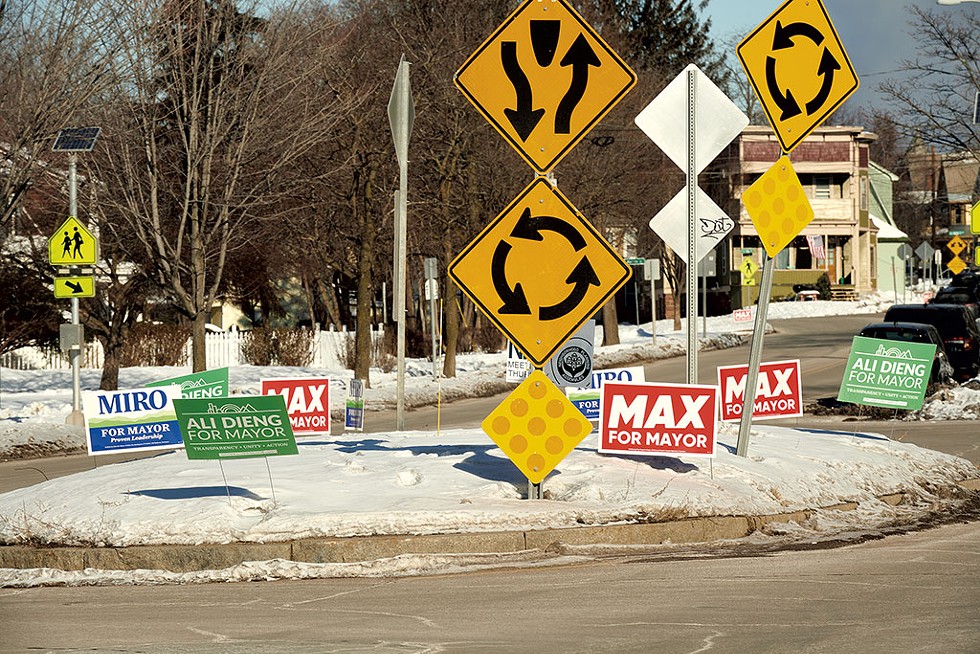
- Bear Cieri
- Campaign signs in Burlington
With just four weeks until the election, Tracy would typically be upping his ground game about now. He'd be packing his Surly bicycle with lawn signs and flyers and hitting the city streets to drum up votes. In each of his other campaigns, meeting people has been his favorite part, he said.
But the pandemic has forced him to campaign differently. Instead of house parties, Tracy has hosted online listening sessions with business owners and residents. Every mayoral debate is virtual, and dropping off campaign literature is a much less personal affair. Many residents will avail themselves of the mail-in ballots the city will provide to every registered, active voter.
An atypical campaign aside, Tracy knows that defeating an incumbent is a tall order. He's banking on the notion that Burlingtonians want change.
"Even more centrist people are tired of what they've seen from Miro in the last several years," Tracy asserted to Seven Days shortly after his campaign launch.
"I think that voters are looking for a clean break," he said then. "I feel comfortable and confident that we'd be a very different administration."
That's exactly why Tracy's detractors believe he'll lose.
Former council president Wright said Progressives should have nominated Councilor Brian Pine (P-Ward 3), not Tracy, if they wanted to win the mayorship. Pine, who has 30 years of public service under his belt, is more moderate than Tracy and could have peeled off more votes from Weinberger, Wright said.
The only problem? Tracy handily defeated Pine at December's Progressive caucus, which saw record turnout.
Wright attributed Tracy's win to "hard-core" Progressives.
"Those are the types of people that come out at a caucus," Wright said. "If you go out to the broader electorate, people feel differently."
Ward 5 resident Mickey Cruz fits that bill. He's lived in Burlington for most of his 49 years and was a big Clavelle fan, but he says the party has changed. Taken individually, Progs' decisions to cut the police force, vote against airport improvements and, in Councilor Freeman's case, protest at the mayor's home, don't seem outlandish, Cruz said, "but when you put it all together, it makes you realize they have become radicalized." He expects Tracy will suffer at the polls for it.
"This isn't the party of 10 years ago," added Cruz, who is voting for Weinberger. "It seems too inflexible and too intense."
Weinberger has painted Progressives with this same brush on the campaign trail, but Tracy supporters are calling BS.
Johnson, the Old North End landlord, said Progs have compromised on numerous initiatives, including the ballot item to ban no-cause evictions. The proposal originally covered owner-occupied duplexes and triplexes, but councilors nixed that provision after hearing concerns from Johnson and others, who argued that they should be able to evict tenants who aren't a good match from their own home.
Progressive councilors also revamped a proposal to reinstate ranked-choice voting after Weinberger last August used his first-ever veto to kill the measure. The new plan, which will also be on the March ballot, only applies to city council races; school commissioners and the mayor would be elected using the traditional system.
"That was a huge compromise," Johnson said. "If I [felt] like this was a radical, dogmatic group of people that were hell-bent on their own ideologies, I wouldn't be supporting them. But they're not."
Still, Johnson acknowledges that Tracy may struggle to defeat Weinberger, especially given the incumbent's ability to raise campaign cash. As of the first campaign finance filing deadline Sunday night, Tracy had raised $42,441 — less than half of Weinberger's $85,997 war chest. Tracy, however, listed 85 more donors than the sitting mayor, suggesting a broader base of support.
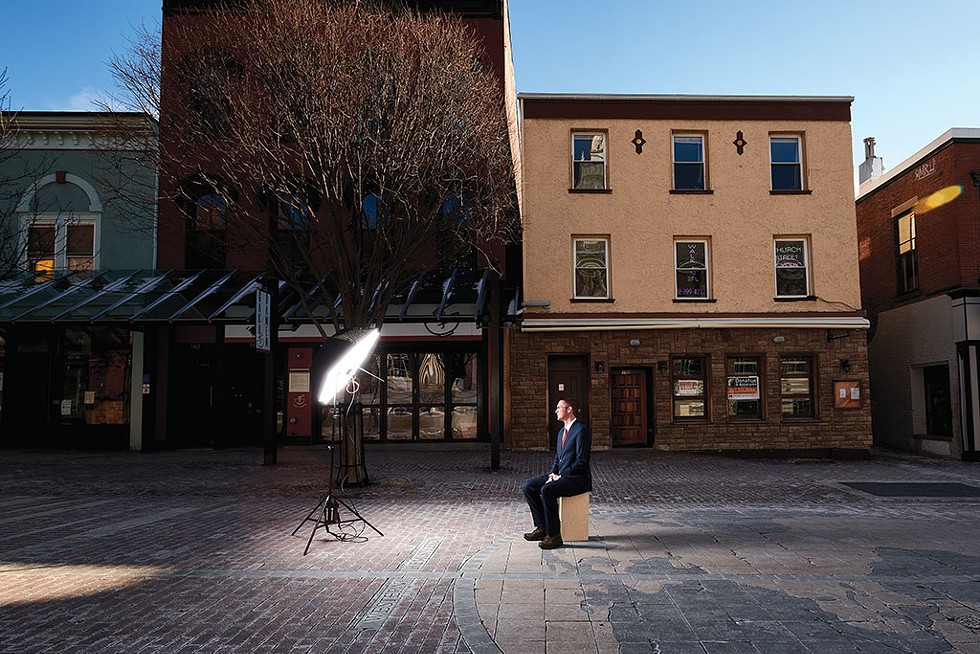
- Bear Cieri
- Max Tracy on Church Street in Burlington
Weinberger, Tracy and Dieng all have tried to stand out in a largely digital race. Tracy's team has a strong social media presence, his website can be translated into four languages, and his smiling face is plastered on a Green Mountain Transit bus. Dieng has hosted virtual Burlington-themed trivia nights, his supporters have written him a campaign jingle, and he has done push-ups to encourage $27 donations. Weinberger, meantime, has conducted a Zoom coffee hour and delivered doughnuts to the first 10 people who signed up for the event. He's planning a series of town halls on issues such as the climate crisis.
Former mayor Clavelle said voter turnout will be key to securing a victory in March, and mail-in voting could very well increase participation.
Tracy is expected to have strong support in the Prog-centric Old North End, which consists of Ward 3 and Tracy's own Ward 2. And though Weinberger captured Ward 1 in 2018, that part of the north Hill Section has a sizable college student population, as does neighboring Ward 8, which could help Tracy.
There's room to grow in those wards, too. Last mayoral election, slightly less than 21 percent of registered Ward 8 voters cast ballots. Ward 2 had a dismal showing of just under 23 percent, and Wards 1 and 3 didn't perform much better.
The New North End, and Ward 4 specifically, has had the city's highest voter turnout — 48 percent of registered voters in 2018's mayoral race and nearly 55 percent last March — making it a key neighborhood in this race. Tracy may not need the New North End to win — Clavelle says he never did and was elected seven times — but he also can't get buried there either, Clavelle said.
Tracy needs an energetic base to offset a loss in the New North End, but Weinberger, who may suffer in the city center, can't afford to lose it. If history is any indication, he may not: The mayor handily carried the New North End in 2018 and 2015. This time, though, the neighborhood is also Dieng's home turf. Even Tracy acknowledges "it's hard to understand who's pulling votes from who in this race."
The contest could also end in a runoff election if no candidate earns more than 40 percent of the vote, as the city charter requires. That match-up between the top two vote-getters would be held on March 30.
As Town Meeting Day inches closer, Weinberger says he's appealing to Burlingtonians of all political persuasions to return him to office. He said voters should ask themselves a simple question before casting their ballot: Is this really the time for drastic change?
"Is this a moment to ... bring in a [new] mayor instead of someone who, for nine years, has learned a lot and grown a lot?" Weinberger asked. "These are times that demand proven leadership."
Tracy supporter Mulvaney-Stanak would pose another question.
"Do you truly want more of Status Quo Miro here, or do you want to be able to vote for a mayor who's actually going to push our city ... to be a place [where] all of us can actually thrive?" Mulvaney-Stanak asked. "That's what leadership like Max Tracy is about."

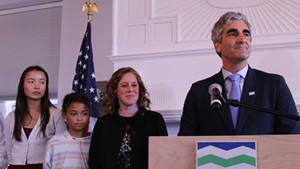
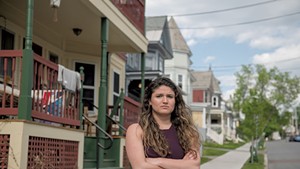
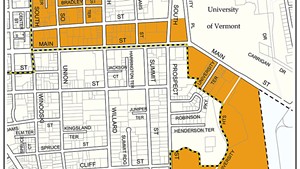
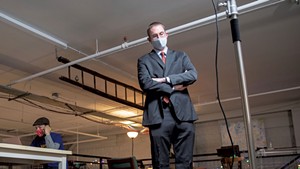
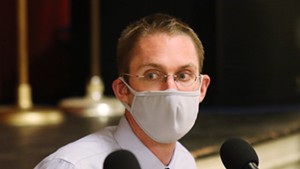








Comments
Comments are closed.
From 2014-2020, Seven Days allowed readers to comment on all stories posted on our website. While we've appreciated the suggestions and insights, right now Seven Days is prioritizing our core mission — producing high-quality, responsible local journalism — over moderating online debates between readers.
To criticize, correct or praise our reporting, please send us a letter to the editor or send us a tip. We’ll check it out and report the results.
Online comments may return when we have better tech tools for managing them. Thanks for reading.